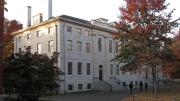All Harvard College courses this semester will be graded on a satisfactory-unsatisfactory system, dean of the Faculty of Arts and Sciences Claudine Gay and dean of undergraduate education Amanda Claybaugh announced in separate emails to faculty and students today. The change comes a few weeks after the University announced that it would move all classes online and evacuate undergraduate dorms for the rest of the semester due to the COVID-19 pandemic.
Students will receive grades of “Emergency Satisfactory” or “Emergency Unsatisfactory” for spring-semester courses, per a recommendation made by the Committee on Undergraduate Educational Policy, an FAS standing committee. “This new terminology is purposefully chosen to indicate the unique nature of this semester in the archival record and to distinguish this semester’s grades from Harvard College’s standard grading system,” Gay explained. Faculty will also be able to add “qualitative assessments of student learning” to students’ records. The Faculty Council unanimously endorsed the proposal, Gay added.
“After leaving campus, students returned home to a variety of circumstances. Many, like those in Massachusetts, are living under various lockdown orders, dealing with the anxiety of the escalating crisis and the frustration of trying to study with a full house of family members,” Gay wrote. “But for some students the challenges have been more severe. Some have seen parent job losses, or have had to take over childcare and other household responsibilities, as healthcare and other essential workers in their families continue to provide critical support or have become ill themselves. Those who relied on the public library for internet access are struggling to find other ways to join their classmates online, as public buildings are ordered closed. Students in a time zone 12 hours away from us are feeling remote and closed off by time, and by closed borders.
“We of course remain committed to academic continuity, but we cannot proceed as if nothing has changed,” she continued. “Everything has changed. I have heard from many faculty who have expressed confidence that they can teach their course material but are increasingly reluctant to assign our normal grades when students find themselves in such different circumstances.
“Not everyone will agree with this policy, and I have heard reasonable arguments on all sides of the issue,” Gay concluded. “That said, we are facing something that imperils the health of every human on the planet. Continuing to pursue our educational mission helps our students, academically and personally. I can’t help but be moved by how present our students want to be. But we must in this moment adjust our expectations of them.”









